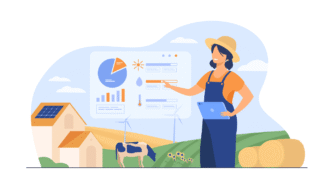LESSON OVERVIEW
The main objectives of this lesson are to:
- discuss human influence on the environment;
- watch a video about plastic pollution;
- explore collocations related to the environment.
With this lesson, students talk about human impact on the planet. They discuss the 4 Rs rule (reuse, reduce, recycle, refuse) and watch a video about plastic waste. Students also look at images and discuss plastic use in food packaging and practise collocations to talk about environmental actions (e.g. waste water, recycle paper, decrease waste, etc.). In addition, they say if they agree or disagree with different perspectives on promoting environmental responsibility, read about companies’ initiatives to reduce waste and discuss how useful they are.
WARM-UP AND DISCUSSION
This lesson starts with a warm-up where students read a quote about the dangers humans pose to the planet. They explain what they think it means and say whether they agree with it. After that, students read the definition of the 4 Rs rule (a set of actions to manage and reduce waste) and think of one more example for each action (e.g. reduce – printing on both sides). They also say if they do any of those things. Next, students watch a short film about plastic pollution in South-East Asia. They say which of the actions from the 4 Rs rule the video is mainly about. Then, students discuss questions about the video’s message on plastic waste. Following that, they look at the images of different food in plastic packages and talk about plastic use in supermarkets.
VOCABULARY AND MORE DISCUSSION
At this point in the lesson, students look at collocations related to the environment and replace verbs with their opposites (e.g. waste water – save water). Then, they add one more noun that could go with each pair of verbs to create more collocations (e.g. waste/save resources). Following that, students choose the correct collocations related to the environment to complete statements about environmental responsibility. Afterwards, they read the statements again and say if they agree or disagree with them. Finally, students read about some companies’ initiatives to reduce waste and talk about how useful they are.
HOMEWORK/REVISION
This lesson plan also includes an additional task that you can use as homework or revision. In the task, students read environmental facts and complete verbs. Then, students decide what each fact is about (e.g. forests, plastic bags, etc.). The task is available in the teacher’s version of the worksheet. You can print it and hand it out to your students. It’s also included in the e-lesson plan.
Subscribe to unlock these and many other Standalone lesson lesson plans with the Unlimited planWORKSHEETS












Very nice!
Thanks! We’re happy you like it 🙂